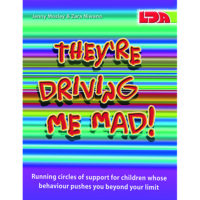Blog, Events and conferences, International, Positive Press Resources
‘Circles of Support’ Research Presented at World Congress on Special Needs Education at Cambridge University (Dec 2018)

I am really happy… a wonderful teacher, researcher and champion of children Stamatina Kalyveza, who was one of my Masters students at Bristol University several years ago, is writing her PhD and basing her research on my Circles of Support model. Circles of Support are best described in “They’re Driving Me Mad” by Mosley and Niwano – click through to see the book in further detail. One of the strengths of the book is the detailed series of session plans, designed to save hours of planning time. These plans feature key developmental activities in a structured and enjoyable series of sessions that are carefully mapped out to cover exploring key areas in turn. Here is an excerpt from Stamatina telling you a little more about her background and research:
“I am very excited to tell you about the research I have just presented at: “World Congress of Special Needs Education” which took place from 10th -13th of December 2018 in the Moller Centre of Churchill College in Cambridge, UK.
The title of my presentation was: “Enhancing the Social and Emotional skills of High School Students with Autism Spectrum Disorder through Peer Network Intervention: The Circle-Time model”.
It all started years ago when I was a Master student at Bristol University in Graduate school of Education and, with Jenny as one of my tutors, I became very excited about Jenny Mosley’s “Quality Circle Time Model”.
Since I have come back to Greece I have been working on projects about educating teachers and parents counselling. However, for ten years now I am working as a teacher for adolescents with learning difficulties and every year I apply Circle-Time to my students trying to enhance their emotional growth.
At the same time I decided that I would be really interested in starting a PhD about high-functional adolescents with ASD without intellectual disability. These students are isolated and bullied three times more than the general population. Although that they do not have a delay in cognitive level they do have deficits in social skills and lack of empathy. Also, they would like to have friends but they do not how to do that. So, in my research I run 3 of Jenny Mosley’s Circles of Support. Each Circle of Support had 1 high-functional adolescent with ASD without intellectual disability and 8-10 typical adolescents. The research was reciprocally beneficial: students with ASD improved their emotional and social deficits and typical adolescents enhanced their social, emotional skills and raised awareness towards diversity and inclusion. This research has been completed now, and I am in the process of writing my doctorate.
From a personal professional point of view I believe that as a teacher my job is not to focus only on the curriculum but to help my students fulfil their potential, by expressing and talking about their problems, their emotions and their dreams. I am happy to tell you what I am doing to travel and to educate.
Circle of Support is a feasible, useful and promising intervention that can be applied by every teacher and should be expanded in secondary education as well.”
Thank you so much for writing this Stamatina, we are really excited to see how your research and writing progresses and we look forward to keeping up to date. If anyone has any notes of interest to send to Stamatina, please send to zaran@jennymosley.co.uk and we can forward these on.
Website Managers Notes

Circles of Support are small circles designed to support children who benefit from additional support. They are highly-focused, facilitated circles specifically designed to follow a series of skills development activities with the aim of children being able to re-join class circle times in the future after ‘catching up’. Click through to see ‘They’re Driving Me Mad‘ by Mosley and Niwano in our webshop as this is the book that describes Circles of Support – click through to see it in the shop.shop as this is the book that describes Circles of Support – click through to see it in the shop.
Jenny taught on the Masters course at Bristol University for 14 years and she is proud that so many of the dissertations coming from her students received distinction and have gone on to do wonderful things in terms of teaching, research and leadership. The modules that Jenny taught on were in the area of self-esteem, self-confidence, circle time, creative arts and therapies.
